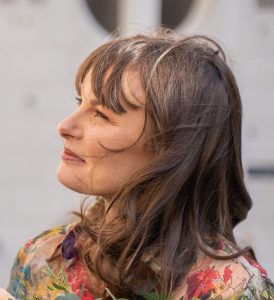Hannah Simpson

Please briefly introduce yourself and what you are currently doing
My name is Hannah Simpson, and I’m originally from Northern Ireland. My snappy professional title is the Rosemary Pountney Junior Research Fellow in British and European Theatre (1890-Present Day), which means that I specialise in modern and contemporary theatre and performance – Rosemary Pountney was a wonderful Beckett scholar and performer and a Fellow at St Anne’s.
I’m working on three main theatre research projects at the moment. I’m finishing up a monograph on the staging of physical pain by Samuel Beckett and other post-WWII Francophone playwrights, and I’m midway through a second monograph on Samuel Beckett and contemporary disability performance. I’m also beginning work on a big new project, The Unexpected Dramatist, looking at the forgotten or ‘unexpected’ plays of modernist authors we more typically consider novelists: Virginia Woolf, E. M. Forster, George Orwell, Flann O’Brien, James Joyce, Elizabeth Bowen, William Faulkner, Ernest Hemingway and F. Scott Fitzgerald.
When did you join St Anne’s and how have you found your time at the College? Have you joined St Anne’s from another institution? If so where and how do you find the two places differ?
I did my undergraduate in English and French at St Hilda’s College, but then I went to Boston University in the US for two years for my MA in English and American Literature – and loved Boston, and very nearly didn’t come back! I loved the rigour of the US academic system – the graduate system in particular demands such an extensive grounding in your wider field – and the focus on academic professionalisation. But I ended up doing my DPhil at St Cross College in Oxford, and after graduating I floated around teaching at a few different colleges before coming to St Anne’s. It’s been a wonderful place to be – so supportive throughout the Covid-19 pandemic, incredibly smart and witty students, and incredible food. I keep sending the kitchen’s Instagram page to friends, to show off.
What is your specialist subject and how did you become interested in this area?
I fell for Samuel Beckett’s work when I was seventeen, and applying for a bursary to study in France for the summer – I was pitching a project about Irish writers who had spent time living in Paris, and needed to find one more author to make it convincing! But once I started reading, I was smitten. I’d been out of formal education for several years during high school due to illness, and feeling under-confident. Beckett came at the right moment for me: here was this man who was constantly uncertain about his own abilities – and about the grounds for anything, really – but who just kept on going anyway with this fascinating, endlessly innovative work. It was a weird ‘lightbulb’ moment for me about things not needing to be perfect, or even pleasant, to be ok – and that strange pessimistic optimism (or maybe optimistic pessimism?) has kept me hooked.
What is your favourite place in Oxford?
It’s less a place than a time: very, very early in the morning, when the streets are still quiet and the skies are just beginning to brighten. Hot coffee in hand, striding purposefully somewhere past beautiful, unaffordable Oxford houses – it’s the best bit of the day!
Have you found any challenges working in academia? If so, how have you overcome them? What is your advice for any others looking to pursue academia?
The job market for humanities is incredibly bleak, and I can’t really claim to have ‘overcome’ anything to make it into a postdoc position – I’ve seen equally good and better colleagues struggle to make their way. I suppose my advice would be a particularly Oxford-esque line I received when I began my DPhil: “Don’t fall into the trap of self-limitation”. Don’t assume that you can’t or shouldn’t do something, simply because you haven’t done it before, or are doing something else as well. You can probably do more than you think! That’s not necessarily a popular thing to say in the era of self-care – and it certainly relies on you enjoying your work for its own sake, alongside being able to scrape a living! – but for me it’s been helpful.
What is your favourite way to relax?
Ah, I have very boring hobbies! Theatre, theatre, theatre, of course – the more, the better. And anything associated with Andrew Scott. I still read for pleasure, especially because my academic work doesn’t involve much novel-reading – Stephen King is my go-to for relaxation at the moment. And my ultimate weekend joy is visiting my niece and nephew, who are little rays of cheeky, smiley sunshine.